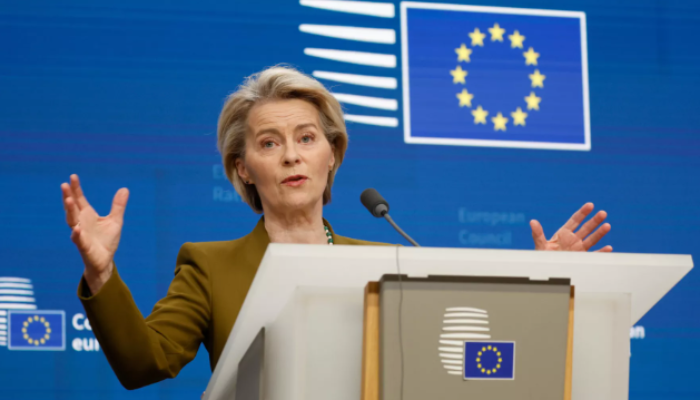
A Major Economic Blow European Commission President Ursula von der Leyen has strongly criticized US President Donald Trump’s newly announced 20% tariff on the European Union, calling it a significant threat to the global economy. Speaking at a press conference following an EU summit in Brussels, von der Leyen warned that the decision could have severe economic consequences for millions worldwide.
“This move will make essentials such as groceries, transportation, and medicine more expensive, disproportionately affecting the most vulnerable,” she stated.
Acknowledging existing challenges within the global trading system, von der Leyen expressed the EU’s willingness to negotiate while also emphasizing the bloc’s readiness to implement countermeasures if necessary.
Trump’s Justification and Market Reactions Trump justified the tariffs, which range from 10% to 49%, as a necessary response to what he described as decades of unfair trade practices. “For over 50 years, American taxpayers have been exploited, but that ends today,” Trump declared. He framed the tariffs as essential for economic growth and national security, vowing that they would bring jobs and industries back to the US.
The financial markets responded swiftly, with US stock futures dropping by 3%, leading to losses in Asian markets. Oil prices also declined by more than $2 per barrel, and Bitcoin experienced a 4.4% decrease in value.
International Response to Tariff Policy The announcement has sparked varied reactions globally:
- United Kingdom: Business Secretary Jonathan Reynolds reaffirmed the UK’s commitment to maintaining its close alliance with the US while exploring trade agreements to mitigate the tariffs’ impact.
- Italy: Prime Minister Giorgia Meloni criticized the tariffs as counterproductive, emphasizing the need for diplomacy to avoid a trade war.
- Brazil: The government hinted at escalating the issue to the World Trade Organization, while Congress passed a bill allowing retaliatory measures.
- China: Beijing vowed to impose countermeasures, citing past instances where it retaliated with increased tariffs on US agricultural goods and restricted critical mineral exports.
- Australia & New Zealand: Both nations disputed the logic behind Trump’s tariffs, with Australian Prime Minister Anthony Albanese calling them “unjustified.” New Zealand’s trade minister, Todd McClay, ruled out retaliation to avoid inflationary effects.
Minimizing Economic Damage Several Asian countries, including South Korea, are strategizing ways to shield their industries, particularly automakers, from potential losses. Meanwhile, Mexico and Canada remain exempt for now under their existing free trade agreement, though Canada previously retaliated against earlier US tariffs linked to steel and aluminum.
The Risk of a Global Trade War Analysts warn that an all-out trade war could be detrimental for both the US and its trading partners. “Trump has put Europe in a difficult position once again,” said Matteo Villa, senior analyst at Italy’s Institute for International Political Studies.
“If the EU retaliates, it risks escalating tensions, but doing nothing may not be an option,” he added. “The hope in Brussels is that a firm response will push Trump toward negotiations and a potential reversal.”
